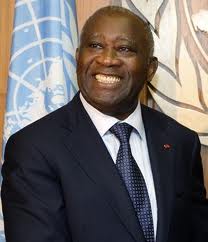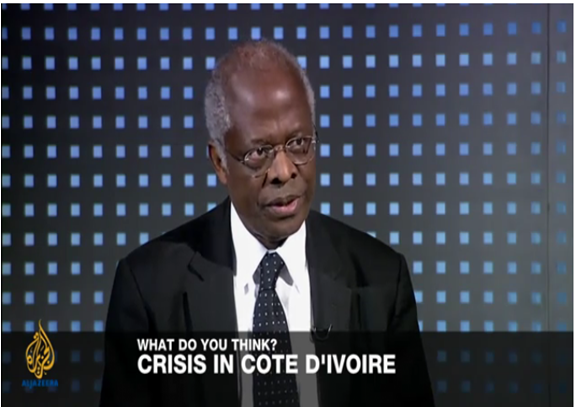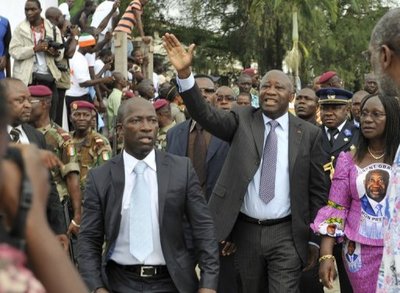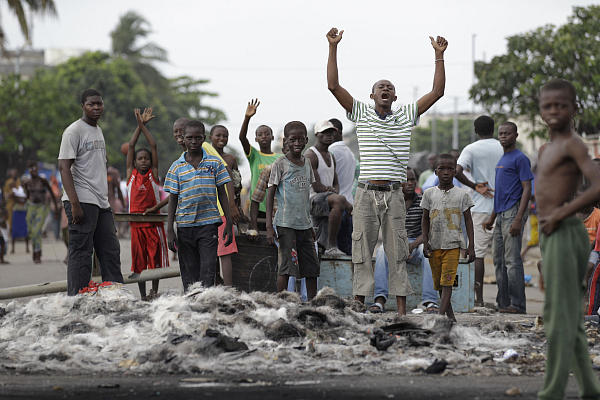 France24 is reporting that former Ivory Coast president Laurent Gbagbo, who refused to acknowledge defeat in the election last November, has been captured and taken to the Abidjan headquarters of rival president Alassane Ouattara, according to "diplomatic sources". Early reports said he was arrested by French troops, there as part of a UN mission approved in March after UN Secretary General Ban Ki-moon and French President Nicolas Sarkozy accused Gbagbo of using heavy weapons against civilians.
France24 is reporting that former Ivory Coast president Laurent Gbagbo, who refused to acknowledge defeat in the election last November, has been captured and taken to the Abidjan headquarters of rival president Alassane Ouattara, according to "diplomatic sources". Early reports said he was arrested by French troops, there as part of a UN mission approved in March after UN Secretary General Ban Ki-moon and French President Nicolas Sarkozy accused Gbagbo of using heavy weapons against civilians.
It is now being reported that Ouattara troops arrested him. Youssoufou Bamba, the U.N. envoy of president-elect Ouattara stated that Gbagbo has been arrested, is alive, and will be brought to justice, according to the Washington Post. They quote Bamba as saying, “That’s the Republican Forces of Cote d’Ivoire who have conducted the operation. Gbagbo is arrested. He is under our custody. . . . Right now, he is being brought to a safe location for the next course of action.” Bamba is also quoted as saying that he was confident that as “the news will spread” of Gbagbo’s arrest, his forces “will stop fighting and they will lay down their weapons.” He added: “Those fighting are fighting for nothing, because this man is over, this era is over. We will address the serious problem of the humanitarian situation and the security situation . . . and restore public order.”

Douoguih: The real reason we’re watching a tragedy in Ivory Coast is that president Gbagbo is a democrat; he is a modern Mandela. He spent 30 years in the opposition. He is not a violent man. He doesn’t have a bank account outside the Ivory Coast. He doesn’t own property anywhere. But his vision is that it is the true emancipation of Ivory Coast. France is afraid of that, because all the former colonies would follow his example, and France would be a big loser. That is what’s at stake in Ivory Coast right now.
Kahn: Let me ask you why they(U.S, UN and France) want Ouattara to be the president?
Douoguih: Here is the reason. Ivory Coast is very rich. And as I told you earlier, president Gbagbo’s vision of running Ivory Coast involves total emancipation. Freedom to deal with all commerce. France does not accept that.”
And leaked cables suggest that the core of the alleged conspiracy is completely groundless in current post-Chirac African policies of France.
The French Conspiracy of Gbagbo government:
“France vetoes Gbagbo government to dominate economy and politics of Ivory Coast”
Gbagbo's dictatorial grip of Ivory Coast has allowed him to dispose of the country's budget at his will. This includes heavily funding Charles Ble Goude, the head of Young Patriots(COJEP), a focal point of young supporters of Gbagbo. A cable 08ABIDJAN396 reveals how Ble Goude was effectively ‘converted’ from a boss of an armed militia to a wealthy businessman and ‘serious politician’, by Gbagbo’s limitless economic support out of Ivorian taxpayers' money.

All actions of Ble Goude have been heavily paid by the taxpayers money
Ble Goude has drawn support from youths of Ivory Coast’s minor ethnic group Bebe tribe, the tribe where Gbagbo is from and representing the southern and western parts of the country loyal to Gbagbo.
He has been able to conduct his costly, large-scale works by means which an officially sworn in government could never dream to use formally; violent looting and strong incitement of terror against its political rivals and personnel from international societies.
He has been under UN sanction since 2006 for this notorious violence; actively participating in looting, rape, extra-judicial killings against UN and other international personnel. The sanction includes banning him from traveling abroad and freezing of assets. His nickname had been Gbagbo’s “Street General” because of his ability to draw storms of young Ivorians within hours by television speeches
Violence has continued today in the economic centre of Ivory Coast, the south-eastern city of Abidjan, and has left one dead after clashes between protesters and police forces began early in the morning. Today most of the businesses in the city remain paralyzed and the BBC reports that the La transmission centre of the national television was “burnt down, but is working again, even though the video is of poor quality”. Political tensions over the outcome of the presidential election past November, when the candidate from the opposition Alassane Ouattara accused Laurent Ggagbo, president since 2000, of fraud, have given way to widespread violence in most of the country.

Several days after the official deadline for the results had expired, the Independent Electoral Commission for Ivory Coast claimed Ouattara as the winner with 54% of the votes. The country’s Constitutional Council, however, declared that the commission had no right to publish the results, having missed the deadline to do so. The President of the Council, Paul Yao N’Dre, also said they had decided to nullify around 500,000 votes coming from pro-opposition areas in the north of the country, alleging that the violence and tension that occurred there during the election invalidated the results. They therefore gave a marginal victory to Ggagbo, with a slim 51% of the votes. Both candidates claim they have been sworn into office. The U.N., along with most of the international community, has sided with Ouattara, and imposed sanctions on the Government, calling Ggagbo to step down. Ouattara is known to have strong connections with the West: he studied economics in the U.S. and worked with the International Monetary Fund as an analyst.
Theme by Danetsoft and Danang Probo Sayekti inspired by Maksimer